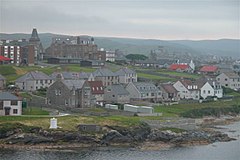Lerwick, Shetland
Lerwick
|
|
|---|---|
 View of Lerwick across Bressa Sound |
|
| Lerwick shown within Shetland | |
| Population | 7,500 |
| OS grid reference | HU474414 |
| • Edinburgh | 300 miles (480 km) |
| • London | 600 miles (970 km) |
| Civil parish |
|
| Council area | |
| Lieutenancy area | |
| Country | Scotland |
| Sovereign state | United Kingdom |
| Post town | SHETLAND |
| Postcode district | ZE1 |
| Dialling code | 01595 |
| Police | Scottish |
| Fire | Scottish |
| Ambulance | Scottish |
| EU Parliament | Scotland |
| UK Parliament | |
| Scottish Parliament | |
| Website | www |
Lerwick (/ˈlɜːrwɪk/) is the main port of the Shetland Islands, Scotland, located more than 100 miles (160 km) off the north coast of mainland Scotland on the east coast of the Shetland Mainland. Lerwick is about 210 miles (340 km) north-northeast of Aberdeen, 230 miles (370 km) west of Bergen in Norway and 230 miles (370 km) south east of Tórshavn in the Faroe Islands.
Lerwick, Shetland's only burgh, had a population of about 7,500 residents in 2010 and is the most northerly and most easterly town in Scotland (there are other large settlements more northerly in Shetland, most notably the village of Brae).
One of the UK's coastal weather stations is located at Lerwick.
Lerwick is a name with roots in Old Norse and its local descendant, Norn, which was spoken in Shetland until the mid-19th century. The name "Lerwick" means bay of clay. The corresponding Norwegian name is Leirvik, leir meaning clay and vik meaning "bay" or "inlet". Towns with similar names exist in southwestern Norway (Leirvik) and on the Faroe Islands (Leirvík).
Evidence of human settlement in the Lerwick area dates back 3,000 years, centred on the Broch of Clickimin, which was constructed in the first century BC.
...
Wikipedia

